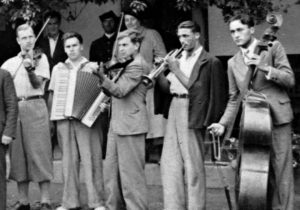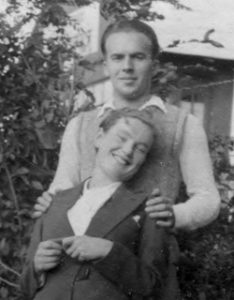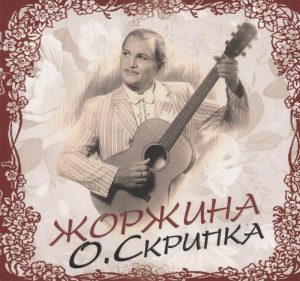Ukrainian students and young people joined the worldwide trend, looking to create something new, refreshing and modern. Young Lvivers were fascinated by Western culture and centred their leisure time on cafés, cabarets and jazz venues. “Clubbing” was not only a new ritual, but also a way of living. Slick hipsters in evening attire gathered on dance floors, at balls and all-night parties, flirting, drinking and listening to jazz, tangos and swing. Towards the end of the 1920s, the revue genre spread in Lviv cafés, cabarets and night clubs, introducing music, jokes, parodies and shows with theatrical elements.
Of course, at that time in Polish-ruled Western Ukraine, the Lviv night-club scene was dominated by Polish jazz bands. Lvivers danced to the music of Warsaw composers, such as Tadeusz Faliszewski, Henryk Wars and many others, as well as cover bands mimicking or re-interpreting original Italian and German hits. During this period, Ukrainian-language music was limited to nostalgic songs about the countryside and cherry orchards that most young people perceived as unbearably out-dated and boring. However, more and more young Ukrainians turned to creating and popularizing modern music in the Ukrainian language. This movement was also supported by Ukrainian nationalist organizations, which sought to encourage patriotism and Ukrainian music, calling “to eliminate futile and boring Polish pop music” and encouraging local musicians to compose trendy musical hits in Ukrainian.

YABTSO JAZZ
Yabtso Jazz included several young men born into patriotic Ukrainian families. Leonid “Yabtso” Yablonsky was the son of a colonel of the Ukrainian National Republic (UNR). Anatoly “Tatsi” Kos-Anatolsky was also the son of a Ukrainian colonel and the Kos-Anatolsky family counted several famous lawyers, doctors and diplomats. Stepan Huminilovych came from a family of teachers and professors. Iryna “Rena” Yarosevych (stage name – Renata Bohdanska; later known as the Polish star Irena Anders) was the daughter of a chaplain serving with the Ukrainian Sich Riflemen; she joined the Yabtso group in 1937-38. But, the driving force behind Yabtso Jazz was Bohdan “Bondi” Vesolovsky , who was born in a family of provincial politicians. Not only did Veselovsky study music, but he also he received a law degree with the intention of launching a political career.

The band gave its first concerts in the Carpathian resort town of Hrebeniv frequented by intellectuals and the “refined elite” (at different periods, Archduke Franz Ferdinand of Austria, Ukrainian Metropolitan Andrey Sheptytsky, Winston Churchill and other celebrities came here to take the waters). In the daytime, the young men hiked through the mountains, and in the evenings, they gathered to play their music for the holidaymakers.
Before joining Yabtso Jazz, Bohdan Vesolovsky formed a group of young men that also performed at such parties. It was not yet a jazz band, but more of a teenage barbershop quartet. Veselovsky joined Yabtso Jazz in the mid-1930s as a pianist, accordionist and composer. It was Bondi that composed their first smash hit - the melancholy tango “Прийде ще час” (The time will come… when you will pine for me).

In 1937, this song was published on paper and became an instant sales hit. Young Lvivers hummed the tune in bars and cafes, whistled it in trams. Here’s the first version of The time will come…, performed by Mykola Svystun, a future army major in the Ukrainian Insurgent Army (UPA).
Yabtso Jazz also created Ukrainian-language covers for European hits. Here’s the world-famous hit La Paloma. Even if you don’t go for retro music, this will pull at your heart strings! Lyrics and musical arrangement: Leonid Yablonsky. Vocal: Myron Eberhardt.
In addition to playing at dance halls and reviews, Yabtso Jazz was a popular feature in corporate evenings for such professions as doctors, lawyers, etc. These were more serious events, where Yabtso Jazz often teamed up with another band led by Ivan Kostiuk, thus creating a real live orchestra. Kostiuk wrote a wonderful recollection of the Press Ball organized on Yaponska Street in Lviv, where he and Yablonsky played in 1935 and 1936:
“The Yablonsky-Kostiuk student orchestra (commonly known as Yabtso Jazz) was composed of at least 10-18 instruments. The dancing started at 9 o’clock in the evening and lasted till 6 o’clock next morning, usually with an hour or two extension ... Two spacious dance halls accommodated the guests, who caroused to the sound of two orchestras playing popular Ukrainian tangos, foxtrots, etc., exclusively composed and arranged by “Tatsi”Anatolsky, “Bondi” Veselovsky and “Yabtso” Yablonsky ...
This dancing was followed by Viennese and English waltzes, tangos, foxtrots, slow foxtrots, rhumbas, the Charleston and karaoke… and at midnight, it was time for the courtly quadrille followed by wild kolomyykas (fast-paced folk dances from Hutsul regions). In nearby cozy smoke-filled rooms, non-dancers played cards or listened to Ukrainian songs performed by amateur choirs led by the unforgettable Levko “Lyonia” Lepky and accompanied on the piano by Nestor Nyzhankivsky, Anton Rudnytsky, Roman Savytsky, and many others.
In this light-hearted atmosphere, young jazzed-up couples danced the night away. The buffets emptied quickly as delicate pâtés, canapés, delicious sausages served with cabbage, savoury borshch and holubtsi (stuffed cabbage rolls) were washed down with wine and horilka. As the first rays of dawn crept through the dance floor, enlaced couples swayed to the sounds of the last tango… many romances were born on these dance floors and later evolved into long-term relationships. Such were the unforgettable press balls in my native Lviv!”

A passionate romance also arose in Yabtso Jazz between Bondi Veselovsky and vocalist Iryna Yarosevych, who sang with the group in Lviv and during their tours in the Carpathians. However, their love affair came to an end in the late 1930s together with the carefree, bohemian lifestyle of the interwar period.
WORLD WAR II
In 1938, as storm clouds gathered over Germany, the young and insouciant members of Yabtso Jazz began drifting apart…sadly, the outbreak of the Second World War brought a quick end to this rich musical age.
Yabtso jazz leader Leonid Yablonsky got married in 1937, his daughter Marta was born in 1938 and in 1942, the family left Lviv for the Czech Republic. In 1948, the Yablonsky family emigrated first to Argentina, and then to Canada, where Leonid worked as conductor in a contemporary orchestra of variety music. Leonid Yablonsky died in Toronto, Canada in 1966.
Anatoly Kos-Anatolsky managed to survive the war and the years of Stalinist repression. He worked quietly as a music teacher at the Lysenko Conservatory in Lviv, wrote music, received the title of National Artist in his late years, was awarded many prizes and titles, and even served as a deputy of the Ukrainian SSR. He died in Lviv in 1983 and was buried at the famous Lychakiv Cemetery.
In 1938, Bohdan Vesolovsky left Lviv and travelled to Zakarpattia (Transcarpathia) to help build the autonomous region of Carpathian Ukraine. However, the short-lived state was soon occupied and annexed by the Kingdom of Hungary, and all local resistance was crushed by March 18, 1939. The region remained under Hungarian control until the end of World War 2, after which it was ceded to the Soviet Union. Vesolovsky first emigrated to Vienna, then in 1949, he and his wife left Europe for Canada, where he worked in the Ukrainian department of Radio Canada International in Montreal. Bohdan Vesolovsky died in Montreal in 1971.
In the late 1930s, Stepan Huminilovych joined the ranks of the OUN (Organization of Ukrainian Nationalists), where he took part in underground activities and played for his comrades. He joined the Galicia Division in 1943, was captured by the British, and spent several years in a POW camp near Rimini. In the late 1940s, Huminilovych emigrated first to Chile, then Argentina, and finally settled in Canada, where he worked as a composer and conductor. Stepan Huminilovych died in Toronto in 1985.
It was a tumultuous decade for Iryna Yarosevych, who adopted the stage name Renata Bohdanska… In the late 1930s, Iryna/Renata joined Tea-Jazz, a group of Warsaw Jews, who had fled the Nazis and settled in Lviv. In the spring of 1941, Tea-Jazz embarked on a concert tour of the Soviet Union, but June 1941 and the Nazi invasion put a halt to their musical concert dreams.
Tea-Jazz continued to perform in camps and collective farms simply to survive, in Chelyabinsk, Penza, Omsk, Tashkent, etc. Things got better for Renata when she joined the orchestra of the Polish Armed Forces in the Soviet Union, informally called the Anders Army. In September 1942, the Polish II Corps passed under British command and was transported to Egypt for embarkation to Italy, where they took part in the Italian campaign, including the Battle of Monte Cassino.
After the war, Iryna Yarosevych/Renata Bohdanska married General Władysław Anders, commanding officer of the Polish II Corps and the couple settled in England. Iryna Yarosevych/Bohdanska/Anders passed away in London in 2010.
BONDI IN CANADA
The years spent in Canada represent the most peaceful and fruitful period of Vesolovsky’s life. First, Bondi worked at the Ukrainian editorial office of Radio Canada International in Montreal and became an active member of the Ukrainian-Canadian Diaspora. He often helped to produce musical revues (popular theatrical entertainment that combines music, dance and sketches), which included nostalgic songs about the lost Homeland.
In the 1960s, Bondi and a group of other Ukrainian-Canadians recorded full-length LPs that were in the spirit of the times and place: pleasant melodious baroque pop, celebrating Ukrainian steppes, valleys and embroidered towns and villages.
Bondi’s unique style is best expressed in his 1970 Mriya album, a compilation of songs written by Vesolovsky in different years and played by different musicians. Here are two songs that illustrate the nostalgia that Bondi and so many Ukrainian émigrés felt in their new homes:
Vocal: Renata Bohdanska-Anders (Iryna Yarosevych) – “Я знов Тобi” (For you, again). Music composed by her first love, Bohdan Vesolovsky. Lyrics: Hanna Chubach. Orchestration: Steve Norbert. Recorded in London in 1969 and released on the Mriya album in 1970.
Vocal: Antin Derbish – “Лети, тужлива пісне” (Fly, my plaintive song…). Music & lyrics: Bohdan Vesolovsky. Graphics: V. Vytkovsky
BONDI’S LEGACY
As Ukraine rediscovers its past – whether it be historical, cultural or literary – there is a renewed interest in historical periods of individual regions, which were a reflection of the times and place.
In 2013, former MP, former Ambassador to Canada, Ambassador of Ukraine to Lebanon Ihor Ostash, published a lengthy book called “Бонді. Повернення Богдана Весоловського” (Bondi. The Return of Bohdan Vesolovsky), complete with new data, rare photos and more biographical materials.
Popular Ukrainian singer Oleh Skrypka, of Vopli Vidoplyasova fame, also picked up on the new interest in Bondi and swinging Lviv of the 1930s. He recorded two solo albums, composed entirely of songs by Vesolovsky: “Серце у мене вразливе... ” (My heart is vulnerable ...), 2009 and “Жоржина” (Georgina), 2011.

Here is Oleh Skrypka’s version of “Карії очі/Як тебе не любити” (Black eyes/How can I not love you) from the Georgina album:
And, to round it off, the most recent release by Lviv's WSZYSTKO Band, Bondi Vesolovsky's Усміх твій таємничий (Your secret smile).
Over the last decade, there have been more and more Vesolovsky and Yabtso Jazz events: commemorative plaques, concerts, and even an annual festival in Bondi’s honour, in Lviv, Kyiv, Poltava and Odesa. Thus, Bondi has finally received well-deserved recognition at home, in Ukraine… while Yabtso Jazz has been acknowledged as one of the first Ukrainian pop legends.
However, these incomparable singers, composers, and groups should not be imprisoned in nostalgia and the long-gone past. Let’s not forget that this unique retro vaudeville scene was created by fun-loving provincial students, hipsters and young people longing for a new Ukrainian sound.
Enjoy this 14-minute musical summary of the Ukrainian retro golden years in Western Ukraine (in English, by Humanitarian Eclectic):
Ahhhh, the days of nonchalance and insouciance are long gone….

